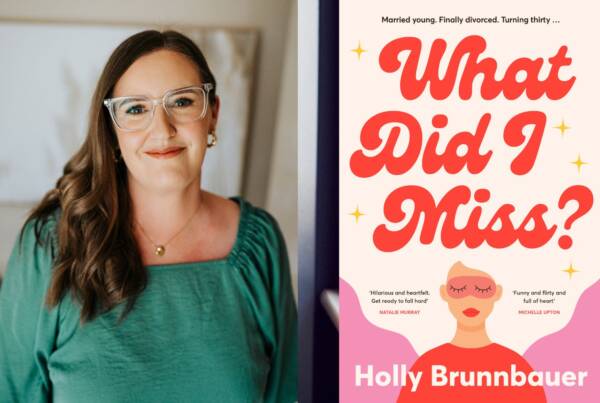This is an edited extract from A Woman’s Voice by Alli Sinclair (RRP$34.99, Penguin Random House Australia). Available now from retailers, as an eBook and audiobook.
1911 – Berlin, Germany
Twenty-one-year-old Ida Naber hunched against the mid-March wind, her red coat flapping around her legs as she strode between the towering pillars of Brandenburg Gate. Skilfully dodging a boy chasing a hoop, Ida made haste along the gravel path of the Tiergarten. Berlin’s grandest park showed subtle signs of spring – small buds on bare branches, and winter heath pushing through the half-frozen ground. In the distance, the Victory Column pierced through the morning mist, its golden angel gleaming despite the wars that haunted its shadow. A couple of older men in dark coats tipped their hats at Ida, their grey beards bobbing in unison. Beneath a linden tree, a young family huddled on a well-worn blanket, with three of the older children bounding along in potato sacks, their squeals of delight filling the cool air. Quickening her pace, Ida finally spotted Tante Frieda’s rail-thin silhouette near the lake. Her aunt stood exactly where she’d promised, tossing bread to the swans that glided across the dark water.
‘Sorry, I’m—’
‘Early?’ asked her aunt.
‘Am I?’
‘No.’ Tante Frieda laughed and opened her arms for Ida to fall into a warm hug, her aunt’s fragrance reminiscent of orange blossoms in the rain. Tante Frieda stepped back and held Ida at arm’s length. ‘How are you?’
‘I’m fine,’ she said quickly, but her aunt’s arched eyebrow guilted her into telling the truth. ‘I’m not doing so well, but it’s not me you should be concerned about.’
Tante Frieda held Ida’s hand as they began walking along the path. ‘I have enough love in my heart to worry about you and your mother. Even your father. Speaking of which . . .’
‘He swears he’s fine, even though I’ve heard him throwing things around the workshop after Mother’s had a particularly bad day.’
Tante Frieda nodded. ‘That’s why I suggested we meet in the park rather than your house. Get some fresh air. Enjoy nature. Give you a chance to breathe.’
Ida bit her lip and fell silent, the weight of her mother’s declining health these past months settling like a stone in her chest.
‘I hate feeling so helpless,’ Ida finally said. ‘Powerless.’
‘It’s difficult, not being in control of what’s going on around us.’ Tante Frieda’s sigh was long and loud. ‘Unfortunately, it’s a lesson we all have to learn.’
‘Doesn’t make it any easier,’ mumbled Ida.
‘No, it doesn’t. I may not have all the answers, but I do have time to listen and a sturdy shoulder for you to lean on any time you need.’
‘Thank you.’ Ida squeezed her aunt’s hand, grateful to have her mother’s sister in her life.
Two young women walked towards Ida, their grey suits nothing like the proper walking dresses Ida was used to seeing in the park. They wore no corsets that she could detect, and their jackets hung straight and severe, like men’s coats. Most peculiar were the pockets – row after row of them, some bulging with mysterious contents. The women’s skirts stopped daringly at the ankle, revealing practical, low-heeled boots, and their hair was coiled tight against their heads without the usual elaborate curves and swoops.
As they passed, the shorter of the two women brushed her hand against Ida’s, pressing a piece of paper into her palm. Before Ida could do more than glimpse the bold black letters – ‘Frauen wählen Solidarität’ (‘Women Choose Solidarity’) – across the top of the pamphlet, Tante Frieda’s fingers clamped around her wrist.
‘Unverschämt!’ The audacity! her aunt spat, snatching the pamphlet away. With sharp, angry movements, she crushed the offending paper into a tight ball and shoved it deep into her handbag – the only place ‘respectable’ women carried items. Her father had once ranted that pockets in women’s clothing were gateways to sedition, allowing the wrong sorts of materials to pass from hand to hand – today was a case in point.
The young women continued striding deeper into the park, their identical grey suits disappearing among the trees like moths fading into the dusk. Ida felt the ghost of the paper against her palm, but it was the words that lingered.
Tante Frieda grabbed Ida’s arm and pulled her once more in the opposite direction. ‘Those women will be the death of us.’
Ida wrestled her arm free and stood in the middle of the path. ‘Why?’
‘Because they’re socialists, trying to dismantle the church, and challenging society’s views on marriage.’
‘Such as?’
‘Advocating for marrying whom they love instead of allowing their father to choose a husband.’ Tante Frieda’s mouth tightened. ‘These women should be grateful when someone arranges a good match for them. A husband, a home, security – while I have to work endless hours to support myself because my father failed to find me a suitor.’ Her stern face softened slightly. ‘You’re fortunate because your father values you enough to teach you how to make instruments, even though being a luthier is not a profession for women.’
‘It’s only because he doesn’t have any sons.’
‘He loves you and you’re a brilliant young luthier. Don’t you ever risk your precious freedom for something as scandalous as that women’s cause. The world works the way it works, dear one. Better to focus on what you can actually have.’
Ida tried to hide her disappointment at her aunt’s attitude, though it shouldn’t have surprised her, as Tante Frieda had always been a pragmatist – unlike Ida’s mother, Annaliese, who held a quiet fierceness about women being treated fairly and advocating for themselves. If only her mother had found a way to action her beliefs and stand up to Ida’s father occasionally.
‘You don’t think women will ever get the right to vote?’ asked Ida.
Tante Frieda frowned. ‘Let’s get you home.’
Ignoring her aunt, Ida gathered her skirts and strode towards the swelling crowd of women gathering on the frostbitten lawn in front of the Reichstag. The parliament building loomed above, its granite facade and enormous glass dome a monument to male authority, casting long shadows over the female protesters. The air crackled with possibility, and even the guards at the parliament’s entrance shifted uneasily, their rifles gleaming in the sun.
A tall woman with fiery red hair and a threadbare blue coat pushed to the front and climbed the steps to the portico. Her face flushed with resolve, she drew herself up to her full height.
‘We are not property!’ she shouted, her voice carrying across the lawn like thunder. ‘We are citizens! We demand our right to vote!’
For a moment, silence fell over the crowd. Then, like a wave building force, other women took up the battle cry. ‘We are citizens! We demand our right to vote!’ The chant grew louder and louder until it seemed to shake the very foundations of the Reichstag.
Ida’s heart raced, her hands shaking not with fear but with a wild joy she’d never experienced before. Daughters of privilege and poverty standing shoulder to shoulder – factory workers with calloused hands, middle-class women with wire-rimmed spectacles and perfectly coiffured hair, mothers with determination etched onto their faces as they struggled to hold on to their wriggling offspring . . . women from every walk of life added their voices.
Was this what change looked like?
‘Shameful!’ Tante Frieda hissed, her complexion a concerning shade of red. She turned to Ida, her eyes wild. ‘These foolish women think they can change what centuries of civilisation have built, as if they could simply march up to the gates of power and demand to be let in.’ Her aunt shook her head and patted Ida’s hand with cloying condescension. ‘A respectable woman knows her place. We will do well to distance ourselves from these rabble-rousers.’
Ida barely paid attention to her aunt’s words. The rhythm of the chant had taken hold, pulling her forwards like an invisible thread. Her proper upbringing warred with the thrill of rebellion. For the first time in her life, she was witnessing what it could mean to be a part of something larger than herself, to feel the pulse of history beat in her very bones.
These women’s voices rang with such certainty, such fearless conviction. Did they really believe they could reshape the world? She studied their faces, searching for doubt, for hesitation, but found only fierce determination. What would it feel like to be so sure of anything? To stand so boldly against everything she’d been taught about a woman’s place?
A young factory worker raised her fist to the sky, while Ida’s hands instinctively sought the safety of the folds of her skirt. Her throat tightened at the mere thought of shouting like they did. In the workshop, she could coax the sweetest sounds from raw wood, but out here, using her own voice? She’d fade like a violin string’s dying note. These women burnt bright as torches against a darkening sky, while she was better suited to the quiet corners where dust motes danced, where the soft scrape of her tools against maple and spruce was the only noise she dared to create.
These women’s voices commanded the world’s attention; hers was better left to whispering secrets to violins.






